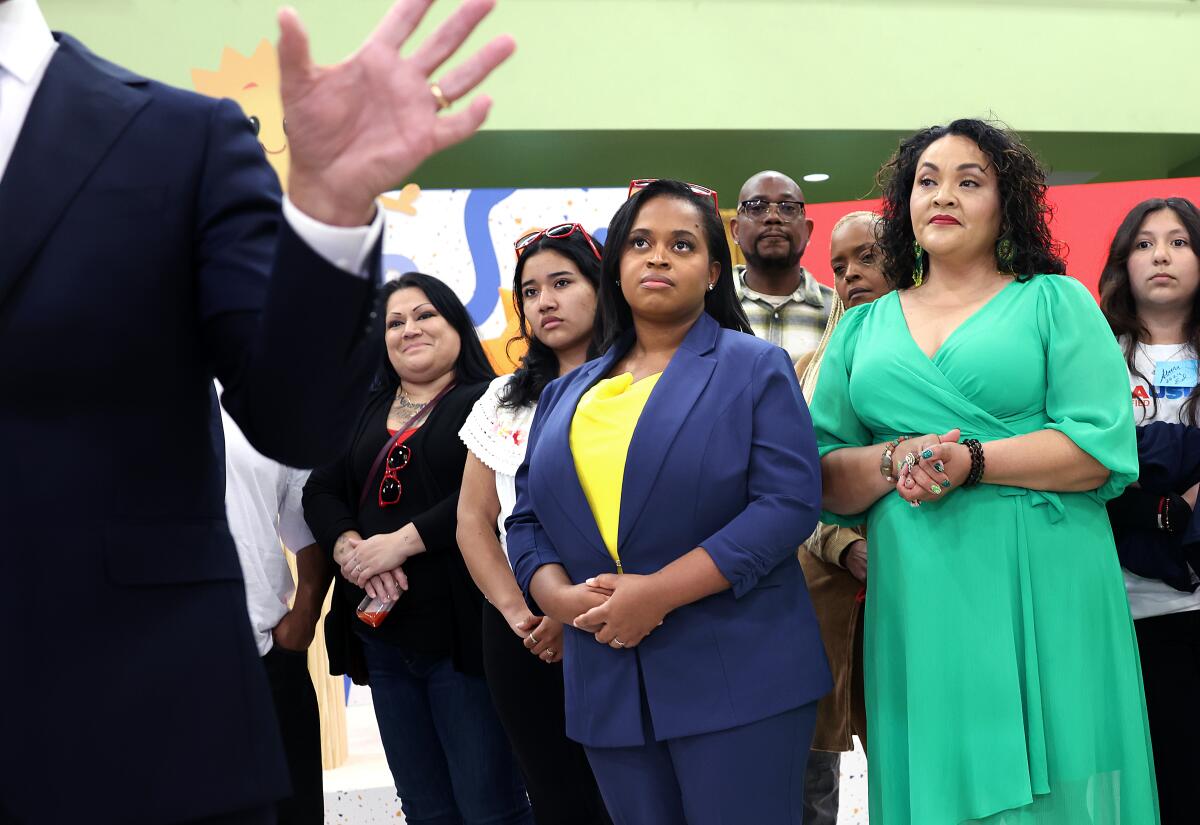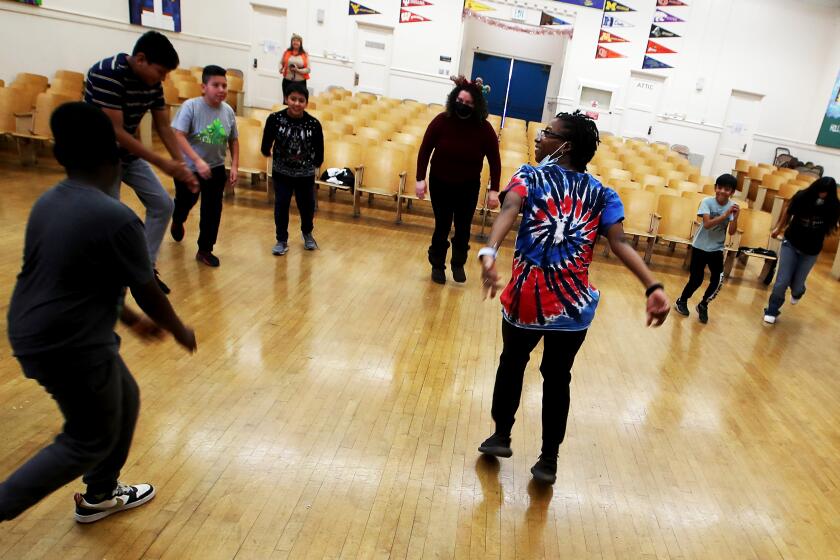LAUSD shelves its hyped AI chatbot to help students after collapse of firm that made it

- Share via
A much vaunted AI chatbot — custom designed to help students thrive academically and parents navigate the complexities of Los Angeles public schools — has been turned off after the company that created it furloughed “the vast majority” of its staff.
The school district said it dropped its dealings with AllHere, the company that created “Ed,” the sun-shaped chatbot, after “we were notified of their financial collapse.” AllHere did not respond to an inquiry this week from The Times and the level of its operation is unclear.
In a separate development, a major data breach has affected a data cloud company called Snowflake, which has worked with L.A. Unified. The district said Tuesday that there is no connection to the AllHere situation, and that it is working with investigative agencies to assess the damage and which district records were obtained through a third-party contractor.
Meanwhile, the district unplugged the chatbot — for which AllHere had been paid $3 million — on June 14, less than three months after unveiling the animated figure as an easy-to-use, conversational companion for students and a soon-to-be-indispensable guide for parents. “Ed” is both a chatbot, personified as a happy, round sun, and an online platform that attempts to put together in one portal student records, assignments, grades, academic recommendations and mental health referrals.
The online platform was introduced in March by Supt. Alberto Carvalho as a historic, one-of-a-kind game-changer in education. It was, he said, a cornerstone of efforts to make school more engaging, up-to-date, individualized and successful. He spoke of setting the pace for the nation in a new technology — artificial intelligence — that is just beginning to sweep the country.
Supt. Alberto Carvalho’s back-to-school speech at Disney Concert Hall took on the air of a Hollywood extravaganza.
Officials on Tuesday emphasized that the chatbot’s information sources remain available on the Ed platform. Users simply must navigate through it in a more traditional fashion — using drop boxes and clicking links. A continuing feature is that information can be found without having to sign in more than once, said Tony Aguilar, the district’s chief of special education and specialized programs.
The district intends to bring back the chatbot, but it’s on hold while officials determine how to proceed.
The Ed system has been hailed as all-knowing in terms of district information as well as fully protective of private information.
It also was a work in progress. The chatbot only answered questions it recognized. Other questions might be met with a response such as “Ask your teacher,” Aguilar said.
AllHere worked with the district to expand the system’s knowledge base, and this work would have to be continued without the collaboration of the Boston-based company. In addition, AllHere had provided human moderators to oversee the system.
Aguilar said the district did not have an inkling of any problems until June 14, when the company announced it was virtually shutting down.
The district’s lack of awareness is a problem, said Stephen Aguilar, associate director of the USC Center for Generative AI and Society, and no relation to the district’s Tony Aguilar.
Although AllHere was a media darling in the tech world, L.A. Unified had the opportunity and responsibility to dig deeper, said Aguilar of USC.
“We can obviously point the finger at companies, especially startups, that are pressured to overpromise and ... generally underdeliver. Especially in this environment, it’s up to cooler heads to prevail and to say, ‘Well, you’re promising me the moon. Let’s see if we can even get this plane off the ground before we get out into space.’ Ultimately, the responsibility rests with the school district.”
AllHere had a contract with L.A. Unified for up to $6 million to see the project through over five years — and has been paid about half of it, the district said in a statement.
Late additions to the Los Angeles Unified School District budget protect jobs and benefits and add arts instruction. Police funding stays about the same.
The nation’s second-largest school system “achieved its goal of developing a product that provided individualized learning pathways for students ... regardless of the outcome with AllHere,” the statement said.
A status check from AllHere was provided by company representative Toby Jackson on June 20, in response to a private inquiry about the firm obtained by The Times.
“It is true that Joanna Smith-Griffin is no longer the CEO at AllHere and, on June 14th, we did have to furlough the vast majority of our employees due to our current financial situation,” Jackson wrote in an email.
“Having said that,” Jackson continued. “I am the Chief Technology Officer here at AllHere and the architect of Ed and I have remained on with a very small team, primarily to ensure that there are no service interruptions to Ed and to help support an orderly transition.”
Chris Whiteley, identified as a former senior director of software engineering at AllHere who was laid off in April, raised concerns about the quality of data protection, according to an article in The 74, an education news website that first reported on AllHere’s troubles.
Whiteley told the education news site that he alerted L.A. school district officials that his company’s chatbot processed student records in ways that probably ran afoul of L.A. Unified’s data privacy rules and put sensitive information at risk of getting hacked — and that no one ever responded to him.
Whiteley alleges that prompts containing students’ personal information were unnecessarily shared with third-party companies. Moreover, seven of eight chatbot requests were processed through overseas servers.
Such conduct would violate the contract with the district, Tony Aguilar said.
Security concerns should not be minimized, said Faith Boninger, a research professor at the National Education Policy Center at the University of Colorado Boulder.
“If I were an L.A. parent or employee, this episode would raise alarms for me,” she said. “The district has no control over the data that it shares with any of the companies that it contracts with. What those companies do with the data is governed by privacy policies and terms and conditions that, as a general rule, do not provide adequate protection.”
In its statement, the school district said it “will continue to take any steps necessary to ensure that appropriate privacy and security protections are in place.”
A festive kickoff
The chatbot was formally introduced with fanfare on March 20 in the decorated gym at Roybal Learning Center on the edge of downtown. There were arches of balloons and a shiny bamboo podium with giant screens on either side.
Posing next to dignitaries was a person in an Ed costume — basically, a round yellow sun with legs.
Almost lost in the blare of a DJ was a table where students were trying out the product — typing in questions and receiving rather boilerplate but potentially helpful answers.
“Simply put,” said Carvalho, “Ed relies on the information that the district already possesses, analyzes, personalizes it to the needs of each student and then builds a pathway, as you will see, for each student in the school system.
“It will tell Maria: ‘You’re falling a little behind in reading. But we got you. Click here.’ Maria will click and without the need for additional sign-on. One single sign-on will open doors to all of the resources to elevate each student’s needs.”
On Tuesday, a district statement offered a more stepped-back explanation:
“Following the pandemic, we were experiencing massive chronic absenteeism issues, declining academic performance and disengaged students. The fully integrated platform combined with a chatbot that provided reminders/nudges was our answer to this growing problem and we wanted to use the most advanced technology available.”
In a March interview with The Times, Smith-Griffin discussed the company she founded. “Our goal was always ... to improve student outcomes by making sure that the right family had access to the right information at the right time,” she said. “A lot of times schools have very impactful practices like mentoring and in-home visiting programs that are very tricky to scale. So the first version of AllHere was all around how do we use technology, in a research-based way. ... That version of AllHere was a 24/7 chatbot for parents that was answering frequently asked questions about school.”
She added: “What has been so powerful around the LAUSD work for us is we had always done work around absenteeism, but their goal was: How do you take this same tech and create a world where it could be used to facilitate student learning with experiences for parents but also kids as well — in age-appropriate, innovative but still very research-based ways?”
More to Read
Sign up for Essential California
The most important California stories and recommendations in your inbox every morning.
You may occasionally receive promotional content from the Los Angeles Times.













